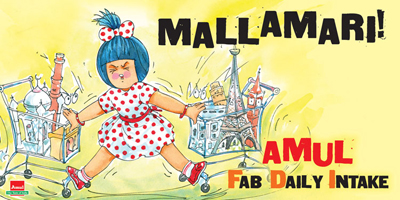Last few days, Government has been trying to pass a bill which raises the FDI limit in multi-brand retail chains to 49%. However, as usual Left has opposed which comes as no surprise. What really surprises me is the opposition by BJP as they are considered to to be the progressive right wing as far as politics of economics goes. Either ways some of the direct and indirect benefits of raising the limit is given below:
Advantages
- Inflation in India is mainly a supply-side issue. The rising disposable income of middle-class is demanding more with minimal increase in efficiency from the supply-side. Government in its bill is asking the foreign retailer to invest 50% in the back-end process. Improving the efficiency will improve the farm productivity and thus increase supply reducing the inflationary pressure. The cost of important food items will reduce in the long run. This is what BJP, CPM and "common man" actually want.
- Any new retail-chain creates multitude of job-opportunities at the front-end. This is clearly evident in the number of malls that we have. Even in IT/ITES services, the housekeeping and security gives a good chunk of population a regular monthly income. Additionally, the setting up of back-end infrastructure, supply chain logistics will create another set of jobs.
- Currently there is no provision of cold-storage which causes around 40% of the supplies to rot. With superior technology and prior experience of foreign retail chains, this loss will be minimized. As they are partnering with Indian firms, this technology know-how will be transferred to Indian firms too.
- To us consumers, apart from the cheaper food items, we will get to have more choices and thus improve our standard of living.
- Big organizations can set up deals directly with farmers thus giving the farmers better deal. Additionally, big organizations will provide latest technologies and best practices which will ensure more yield per area of irrigation. The best example here is Amul which leverages farm produce across Gujarat and thus help give the cattle-owners good deal.
Disadvantages
- The major chunk of people losing out here will be the small kirana stores and the middle-men. However, as with other industries, the smartest of them will find ways to survive under changing business scenario.
- The second argument is building up the cold storage and infrastructure is government business. Do we really need another 2G proportional scam where tax payers as usual are looted of their money or better invite private sector which already has the tech know-how and experience in implementing it?
- Another argument is the Wal-mart and Tesco taking over the entire supply-chain. Well, if the bill is debated in the parliament, I do not see a way, by which government cannot impose certain curbs to prevent taking over of entire supply chain.
So at the most, the loss will be limited only to the kirana store owners and middle-men. So not sure, what the opposition is opposing here. Are they opposing the welfare of the citizens over selected kirana store owners and middle-men?
PS: I have given a bit simplistic view here. Getting hard core numbers would have resulted in similar conclusion. However, in interest of sleep and a bout of laziness has prevented me from doing so.
P.PS: Extensive analysis available here
P.PS: Extensive analysis available here

No comments:
Post a Comment